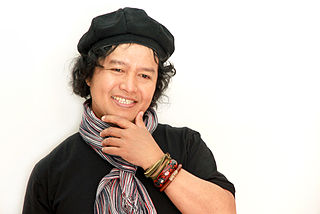A Quote by Sandra Cisneros
My friend, Dennis Mathis, was reading Eastern European and Japanese experimental writers, and I brought the Latin American writers to his attention, so we exchanged books and bounced off one another.
Related Quotes
I always read the Latin American writers. I love so many of them: Gabriel García Márquez, José Donoso, Alejo Carpentier, Jorge Luis Borges, Clarice Lispector. I also love a lot of American experimental writers and surrealist European writers. But perhaps The Persian Book of Kings was the greatest influence - I encourage people to look at it. There is such a wealth of incredible stories.
I didn't ever consider poetry the province exclusively of English and American literature and I discovered a great amount in reading Polish poetry and other Eastern European poetry and reading Russian poetry and reading Latin American and Spanish poetry and I've always found models in those other poetries of poets who could help me on my path.
I read continually and don't understand writers who say they don't read while working on a book. For a start, a book takes me about two years to write, so there's no way I am depriving myself of reading during that time. Another thing is that reading other writers is continually inspiring - reading great writers reminds you how hard you have to work.
There's the fact that American fiction is basically the most apolitical fiction on the globe. A South American writer wouldn't dare think of writing a novel if it didn't allude to the system into which these people are orchestrated - or an Eastern European writer, or a Russian writer, or a Chinese writer. Only American writers are able to imagine that the government and the corporations - all of it - seem to have no effect whatsoever.
I don't believe that fiction is dead. I know there are some people who believe that it's an outdated art form, and that to express truth today you need to work in different forms, to write books where it's perhaps not clear what's fiction and what's memoir. I have nothing against those books and love many of them very much. But we have enough space for everyone, traditional realists and hybrid writers, and experimental writers all.
Incidentally, I am intrigued by how many European and Latin American writers expressed their political views in the columns they routinely wrote or write in the popular press, like Saramago, Vargas Llosa, and Eco. This strikes me as one way of avoiding opinionated fiction, and allowing your imagination a broader latitude. Similarly, fiction writers from places like India and Pakistan are commonly expected to provide primers to their country's histories and present-day conflicts. But we haven't had that tradition in Anglo-America.
In company with people of your own trade you ordinarily speak of other writers' books. The better the writers the less they will speak about what they have written themselves. Joyce was a very great writer and he would only explain what he was doing to jerks. Other writers that he respected were supposed to be able to know what he was doing by reading it.



































